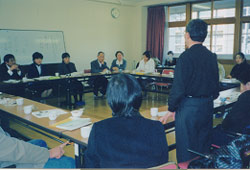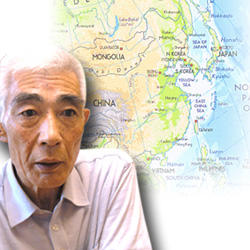‘As Japanese, we wish to live as respectable human beings’:
Orphans of
by Nishioka Hideko
[Modern wars always produce large numbers of orphans, nearly all from the invaded nation.

PIC Japanese WW II orphans returning from
march in protest in
Zanryu koji, a term created by the Japanese State and media, literally means “orphans who have remained behind [in
While the article is about those orphans who demand that the Japanese state treat them as full-fledged citizens of
In 2002, “Japanese who had been orphaned in
The leader of the
In his childhood, neighborhood children constantly teased Matsuda calling him “little Japanese devil.” His adoptive parents were so poor that he could not complete elementary school. During the Cultural Revolution, he lost his job after being accused of being “a Japanese spy”. Wearing a tag that says “counter-revolutionary element,” Matsuda was subjected to mass criticism at a mass meeting of seven hundred people. Recalling these days, he says, “I often entertained the idea of killing myself.” In 1971, his adoptive parents and wife died of the emotional stress of this incident. To prevent his children from experiencing the same fate, Matsuda decided to return to
The Wall of the Japanese Language
At the end of the Asia-Pacific War, the Japanese state abandoned its overseas citizens. For this reason, deaths among the agrarian colonists stranded in
In 1974, Yasuko wrote a letter to the governor of
Although
The orphans who were finally able to return to
In 1984, the Japanese state began providing returning orphans with temporary lodgings and language instruction. By then, however, they were over forty. In addition, the state refused to allow them to return with their entire families (except for immediate family members), so they were forced to leave them in
The Japanese state had long regarded the problems of orphans as their problems, not as problems caused by the state. Even though in 1994 the state implemented Legislation to Promote the Independent Living of Orphans, the state did not reformulate the basic policies for that end. At the same time, the state failed to create an effective network of state institutions that are concerned with the welfare of orphans.
In August 2004, the Japanese Ministry of Health and Welfare sent questionnaires to 1,846 orphans who had filed lawsuits. Among them, 1,692 responded. Just one percent indicated that they were comfortable with the Japanese language. Indeed, the wall of the Japanese language prevents orphans from becoming economically independent. Hence, most of the aged orphans are forced to rely on welfare after arriving in

A scene from a Japanese language
class for zanryu koji,
Yamada Naoko (age 63) returned to
I conclude this report with a statement by Sugawara Kosuke, the lead lawyer of the first group of orphans who brought suit against the Japanese state in
The orphans were stranded in
Translator’s note
On July 6 th, 2005, the Osaka District Court handed down the following verdict to zanryu koji:
The Japanese state should have better coordinated the permanent return of zanryu koji to
Nishioka Hideko is a freelance writer. This article, which appeared in Shukan Kinyobi on
Posted at



